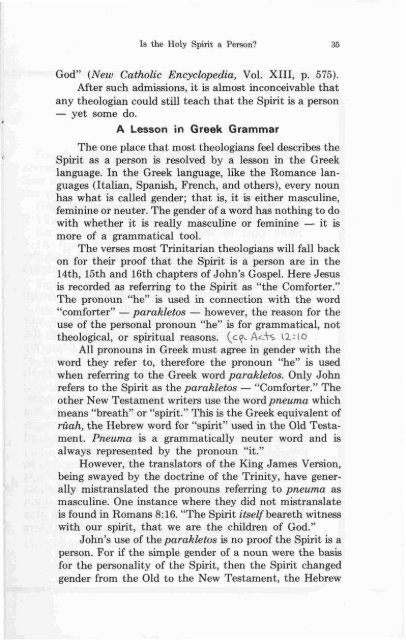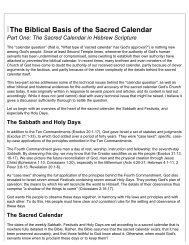Is God a Trinity - Herbert W. Armstrong Library and Archives
Is God a Trinity - Herbert W. Armstrong Library and Archives
Is God a Trinity - Herbert W. Armstrong Library and Archives
Create successful ePaper yourself
Turn your PDF publications into a flip-book with our unique Google optimized e-Paper software.
<strong>Is</strong> the Holy Spirit a Person? 35<br />
<strong>God</strong>” (New Catholic Encyclopedia, Vol. XIII, p. 575).<br />
After such admissions, it is almost inconceivable that<br />
any theologian could still teach that the Spirit is a person<br />
- yet some do.<br />
A Lesson in Greek Grammar<br />
The one place that most theologians feel describes the<br />
Spirit as a person is resolved by a lesson in the Greek<br />
language. In the Greek language, like the Romance languages<br />
(Italian, Spanish, French, <strong>and</strong> others), every noun<br />
has what is called gender; that is, it is either masculine,<br />
feminine or neuter. The gender of a word has nothing to do<br />
with whether it is really masculine or feminine - it is<br />
more of a grammatical tool.<br />
The verses most Trinitarian theologians will fall back<br />
on for their proof that the Spirit is a person are in the<br />
14th, 15th <strong>and</strong> 16th chapters of John’s Gospel. Here Jesus<br />
is recorded as referring to the Spirit as “the Comforter.”<br />
The pronoun “he” is used in connection with the word<br />
“comforter”- parakletos - however, the reason for the<br />
use of the personal pronoun “he” is for grammatical, not<br />
theological, or spiritual reasons. (cp Ach (2: IO<br />
All pronouns in Greek must agree in gender with the<br />
word they refer to, therefore the pronoun “he” is used<br />
when referring to the Greek word parakletos. Only John<br />
refers to the Spirit as the parakletos - “Comforter.” The<br />
other New Testament writers use the wordpneuma which<br />
means “breath” or “spirit.” This is the Greek equivalent of<br />
rfiah, the Hebrew word for “spirit” used in the Old Testament.<br />
Pneuma is a grammatically neuter word <strong>and</strong> is<br />
always represented by the pronoun “it.”<br />
However, the translators of the King James Version,<br />
being swayed by the doctrine of the <strong>Trinity</strong>, have generally<br />
mistranslated the pronouns referring to pneuma as<br />
masculine. One instance where they did not mistranslate<br />
is found in Romans 8:16. “The Spirit itself beareth witness<br />
with our spirit, that we are the children of <strong>God</strong>.”<br />
John’s use of theparakletos is no proof the Spirit is a<br />
person. For if the simple gender of a noun were the basis<br />
for the personality of the Spirit, then the Spirit changed<br />
gender from the Old to the New Testament, the Hebrew

















